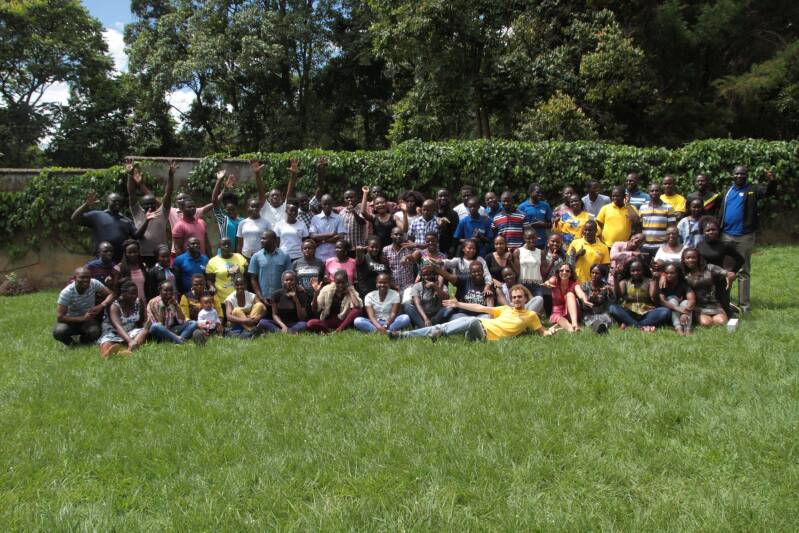David Disch and Rocio Perez Ochoa are the founders of Bidhaa Sasa, a last-mile distribution and finance company helping households in rural Western Kenya. In the following interview, Rocio talks about the challenges she faced as a female founder and her mission to improve livelihoods, by making modern products both accessible and affordable.
How has Bidhaa Sasa incorporated digital technologies into their platform?

“Although our clients are not yet smartphone users and e-commerce is still not relevant to them, our business has since the start in 2015 digitized all processes and put in place a mobile-first infrastructure to collect data from clients and staff in an effortless way. The data and analytics capabilities of the business aim to increase efficiencies for all our staff and to derive insights for further market opportunities.”
What are the challenges and obstacles that you faced as a female founder?
“There are a lot of subtle things that work against you by just being a woman. I don’t know if I’m being discriminated against, for example, my fundraising point of view, because I don’t have anything to compare my experiences to. I have a lot of anecdotes of comments that people have made, which were obviously biased. Men making observations in public about the looks of female entrepreneurs or the way they speak when pitching which clearly they would not have made if it had been male founders. On the investors’ side, it’s hard to know if I have been discriminated against since I don’t know how they treat male founders. I don’t know if they ask me different questions than to them. But there has definitely never been any kind of positive discrimination, such as gender-lens investing. No one has ever told me that they wanted to support me specifically because I am a woman except for one truly gender-intentional investor.
On the practical side, I agree that it is more difficult for women to participate in the “social side” outside of work. For example, I work in London, so when we started our business, it was clear that I would not relocate to Kenya, I have a family here, I have kids in school. My business partner who’s in his early 30s has a lot more flexibility. So from day one, it was clear that I could only travel a little bit, whereas, for many male counterparts, even the ones who have family, there is no problem spending three weeks on the road, which would be a massive problem for me.
Five years ago, when we started, my kids were still in primary school. Since then, we have done three accelerators, two of which were in-residence. One of them was running for five weeks, how on earth could I participate in that? That clearly discriminates against people who have family commitments. I did attend, but contrary to David, I could not participate full-length. So there really are expectations that you can just drop everything and travel around the world because you are committed and passionate about your business. But this world is designed for the traditional man, who has a stay-at-home wife who can take care of the children, and he is able to spend as many weeks on the road as he pleases. So, I’m really excited about these times where everyone is working from home because it addresses these problems with balance and presentism that many women cannot afford. It’s funny because in these presential accelerators you had these two groups of women, the young one without any children, and the older ones whose children are already grown up but nothing in the middle.”
What are the challenges that come with social entrepreneurship?

“The main problem is the definition of social businesses varies across countries, and some don’t even have one. Since we are not an NGO, for a lot of jurisdictions we are a for-profit company. So we are disadvantaged when we’re looking for support programs or discounts that only serve NGOs. Once we had to disclose our reinvestment policy to prove we’re a social business, although reinvestment has nothing to do with having a social cause. In Kenya, for my employees we’re not a “social enterprise”, we’re a “good” company. NGOs are not popular as an employer because they don’t provide stable, long-term jobs, so we try not to resemble an NGO. We are often asked how long we are going to stay because people expect foreigners to leave again at some point.”
If you could change one thing in the start-up ecosystem to make it more inclusive towards women, what would it be?
“I attend a lot of conferences where all the panelists are men. The lack of women is rarely addressed. What really annoys me is how tech-centric this world is, for all major issues, it is always technology that is supposed to solve them. When you think like this, you automatically exclude a lot of people, everyone who is not a male tech student from Western or maybe Indian universities. They are trying to solve problems they don’t even understand. Corporations too often create gadgets for clients whose struggles they don’t know. Since I have a background in physics and finance, I am used to being the only woman in the room. I think these gender divides within disciplines are still not being addressed, maybe they are even getting worse.”
